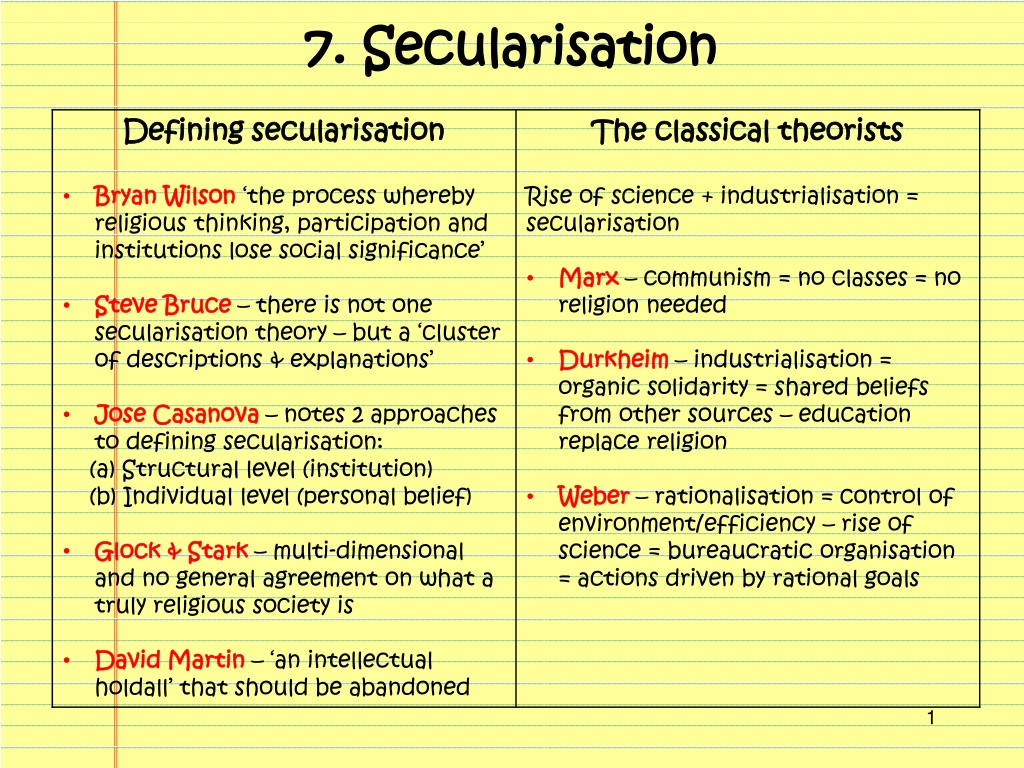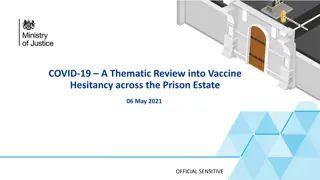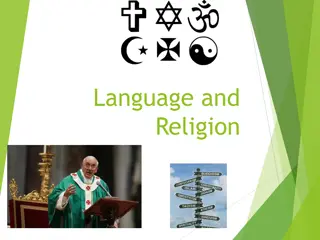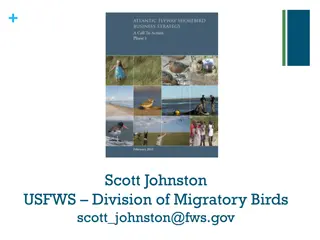Understanding Secularisation: The Decline of Religious Influence in Society
Secularisation refers to the process in which religious thinking, participation, and institutions lose their social significance. This phenomenon is influenced by factors such as the rise of science, industrialisation, changing social attitudes, and the disengagement of the church from society. Evidence of secularisation includes declining religious participation, beliefs, and influence, as well as the rise of religious pluralism and the marketisation of religion in a postmodern context.
Download Presentation

Please find below an Image/Link to download the presentation.
The content on the website is provided AS IS for your information and personal use only. It may not be sold, licensed, or shared on other websites without obtaining consent from the author. Download presentation by click this link. If you encounter any issues during the download, it is possible that the publisher has removed the file from their server.
E N D
Presentation Transcript
7. Secularisation 7. Secularisation Defining secularisation Defining secularisation The classical theorists The classical theorists Bryan Bryan Wilson Wilson the process whereby religious thinking, participation and institutions lose social significance Rise of science + industrialisation = secularisation Marx Marx communism = no classes = no religion needed Steve Bruce Steve Bruce there is not one secularisation theory but a cluster of descriptions & explanations Durkheim Durkheim industrialisation = organic solidarity = shared beliefs from other sources education replace religion Jose Casanova Jose Casanova notes 2 approaches to defining secularisation: (a) Structural level (institution) (b) Individual level (personal belief) Weber Weber rationalisation = control of environment/efficiency rise of science = bureaucratic organisation = actions driven by rational goals Glock Glock & Stark & Stark multi-dimensional and no general agreement on what a truly religious society is David Martin David Martin an intellectual holdall that should be abandoned 1
Secularisation Secularisation the big picture the big picture Decline Decline in participation participation Less and less people attending church in Decline in Decline in belief belief Decline in Decline in religious religious institutions institutions Bruce Bruce notes: Belief without belonging Gill Gill big drop in belief in a personal God/ ideas about the afterlife Religion losing influence Crockett Crockett church attendance in 1851 (40%) Golden Age (Victorian UK) State performs many roles that the church once did, ie) welfare Many people claim to belong to a religion Only 6.3% attend church on Sunday today Hard to measure authentic belief in surveys (ie, 390 000 claimed to be Jedi in census) Clergy/population ratio has dramatically fallen Sunday schools, church weddings, baptisms all declined Changes in social attitudes sex outside of marriage, cohabitation, divorce, less marriage, rise in crime etc 2
Support Support for Secularisation for Secularisation Evidence/Explanation In brief Decline Decline in Religious Participation in Religious Participation Fewer people attend church/less ceremonies Decline in beliefs Decline in beliefs Changing attitudes on issues Less belief in God Religious pluralism Religious pluralism Many faiths = no universal faith in society Fragmented less influence Disengagement/ differentiation Disengagement/ differentiation Church withdrawn from society Less power and influence Church not focal point of community Disenchantment Disenchantment Rational attitude faith in science Man control of the world Disneyfication Disneyfication/loss of meaning /loss of meaning Marketisation of religion has lessened its authenticity in a postmodern age 3
Studies/Evidence Studies/Evidence Crockett Crockett low attendance Drop in baptism, church weddings, Sunday school etc Evaluation Evaluation Golden age? Unreliable stats in past motives Diff. religs measure member in diff ways Believing without belonging (Davie) Identity/cultural defence ethnic min. Not all countries have low participation Brierley Brierley non-christ. Religions increased Greater choice and diversity Different beliefs = greater commitment Faith not dictated by tradition but by true/meaningful choice Participation Participation (Davie) Wilson Wilson 1 faith = strong (Durkheim) Decline of community Decline of community (Bruce) diversity and bonds decline Immigration many faiths = waters down impact of single faith Religion can t support all values..no monopoly on truth (Berger) Bruce Bruce church has less power and influence in wider society Specialisation of church s roles by other institutions (Parsons) Church /spirituality marginalised in society not focal point of community Pluralism Pluralism (Bruce) (Berger) Religion still source of education and welfare (nationally and globally) Education Trusts linked to religions Church - more effective in role Civil religious experiences/media coverage Generalisation of relig. Values (Parsons) Casanova Casanova religion in public life still Significant interest in ghosts, UFOs, spoon bending, ESP, mediums still Recent growth in alternative beliefs and a spiritual revolution Pomo rejection of metanarratives Disengagement Disengagement and and Diffentiation Diffentiation (Parsons) (Parsons) Rationalisation = scientific outlook Desacrilisation less driven by mystical/supernatural beliefs (Weber) (Weber) Technology = greater control of world (Bruce) (Bruce) Disenchantment Disenchantment 4
Challenges Challenges to Secularisation to Secularisation Evidence/Explanation In brief Resacrilisation Resacrilisation & the spiritual revolution revolution & the spiritual A religious revivalism more individualist spirituality Growth in NAMs and sects Believing without belonging Believing without belonging Private sphere = religion No longer need collective worship Rise of fundamentalism Rise of fundamentalism People turning to fundamentalism rather than traditional faiths Existential security theory Existential security theory Certain people/places have a greater need for religion, ie) poorer societies Richer countries are more secure so have less need = certainty Cultural defence/transition Cultural defence/transition Religion can be important source of identity Religion provides support/community for migrants Structural differentiation Structural differentiation (the flip side) side) (the flip Religion specialises role now/more effective in spiritual matters Pluralism Pluralism (the flip side) (the flip side) Greater diversity and choice not dictated by tradition links to resacrilisation) 5
Studies/Evidence Studies/Evidence Heelas Heelas move from trad. religion Religious renewal individualistic spirituality self religions (World Affirming NRMS/NAMs) Personalised hybrids pick n mix Spiritual market is growing.. Personal choice/less demanding Evangelic faith s appeal = healing and self improvement Davie Davie privatised faith Less community focused nature Evaluation Evaluation Bruce Bruce very few into New Age Wilson Wilson sects = last gasp for religiosity Wilson Wilson NRMs etc = middle class indulgence meditation & sushi Resacrilisation Resacrilisation Believing Believing without without belonging belonging Rise of Rise of fundamentalism fundamentalism Voas Voas & Crockett & Crockett continual decline in believing as well as belonging Attendance = commitment Bruce Bruce slowed down secularisation but lack power/influence and impact Only gained attention because they are so extreme in a secular world Almond Almond global rise in fundamentalism Need for certainty/tradition Roof & McKinney Roof & McKinney USA New Christian Right = Conservatives tradition/morality (see (see Fundamentalism Fundamentalism slides) slides) Existential Existential security theory security theory Norris & Norris & Inglehart Inglehart 3rd world religion is strong = high risks and need for security (compensation) Bruce Bruce focal point for identity for some groups under threat (cult. defence) Help migrants/eth, min. with support and community (cult. Transition) Parsons Parsons religion more specialised and generalisation of values Greater choice/diversity religiosity = more meaningful Vasquez Vasquez over reliance on income data See religion as a negative response Ignore positive appeal to wealthy too Bruce Bruce religion only survives because of identity role (not about spirituality) Cultural Cultural defence/ defence/ transition transition Structural Structural differentiation differentiation Pluralism Pluralism Are values so generalised today? More diversity = fragmented and weak Ecumenicalism is proof of weakness of faiths (Wilson) (Wilson) 6
Secularisation Other considerations International International comparisons comparisons Different Different social groups social groups Problems defining secularisation Problems defining secularisation USA high religiosity Most Europe 40% Brierley Brierley (only small drop in Christianity globally) Islam increasing globally Christianity in Ireland USA New Christian Right/Televangelism It is not a single process equal to all societies (Martin) (Martin) Ethnic minorities maintain religiosity (although 2nd generation less so) Women more religious than men Different groups = different needs, ie) cultural defence/transition, compensation etc Shiner Shiner at least 6 definitions of secularisation in use Glock Glock and Stark and Stark multidimensional Martin Martin abandon the term This theory underestimates the level of diversity in practice/belief inclusive definitions are vague and allow religiosity to trap more religiosity How far religious institutions are religious? ( (Herberg Herberg/ /Bellah secularisation from within (Bruce) Problems measuring secularisation Problems measuring secularisation Bellah) ) (Bruce) Martin Martin Strength of religion depends on : link to identity (ethnic, national and regional) Link between church/state Degree of pluralism Sects/Cults/NRMS/NAMS Sects/Cults/NRMS/NAMS Greeley Greeley renewed interest in spiritual in the West Brierley Brierley rise in non-trinitarian christian churches/other faiths Heelas Heelas & & Woodhead Woodhead spiritual revolution New Age rise meet personal choice/self-religions/suit lifestyle/hybridity/self-improve. Bruce Bruce irrelevant with little impact in society new age beliefs are weak/personal Berger Berger islands in a secular sea Church Church participation participation Under-estimates/over-estimates Self collected data issues Using different definitions/criteria People attending in past for social reasons/status/pressure (Martin) Problem defining golden age (Martin) Kepel Kepel Religious revivals around the world (Islamization, Christian fundamentalism) Reactions to secular governments & modernity Opinion polls Opinion polls Measuring belief =problem abstract Interpretation of questions How far do actions match beliefs? ( (Haddaway Haddaway et al) et al) 7
Secularisation top tips for angles in questions 1. Look out for those 18 markers (that look at a small part of the debate) remember these 18 markers give big marks for blending different ideas together Religion no longer = shared values/universe of meaning - A kind of role of religion meets elements of secularisation + postmodernity Q Church of England declining..other religions getting popular - Resacrilisation question/focus on participation evaluation/cultural defence/ - pluralism/fundamentalism 2. Those short questions on problems with using statistics on belief 3. Essays on there is a spiritual revolution ( where you look at evidence of resacrilisation/NRMs/evangelical churches/fundamentalism etc and then evaluate in a secularisation capacity with Pomo considerations) 4. Essays on secularisation only in the USA/Europe (explore the secularisation argument but pay clear focus to international comparisons/globalisation/ resacrilisation / fundamentalism/existential security etc) 8























